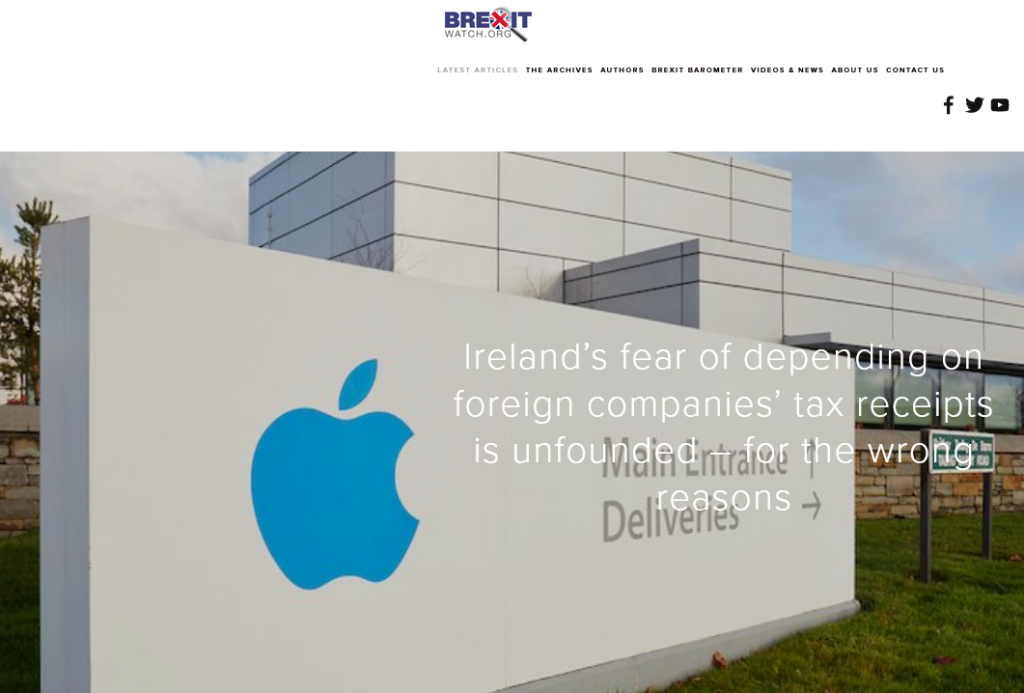Published on 18 March 2022
Our Brexit-Watch.org article last week showed how tax-leveraged leasing through Ireland was a major contributor to the BigTech and Biotech companies minimizing their corporation tax payments:
https://www.brexit-watch.org/irelands-fear-of-depending-on-foreign-companies-tax-receipts-is-unfounded-for-the-wrong-reasons
Whilst Rishi Sunak’s much-trumpeted minimum 15% global corporation tax rate won’t have any effect at all, the Kremlin has intervened by passing a law that re-registers 500+ aircraft to Russia, these being aircraft primarily leased from Ireland:
https://edition.cnn.com/2022/03/16/business/russia-aircraft-seizure/index.html
This will be a major shock for the Irish aircraft leasing model.
The financial structure is that an Irish LLP (Limited Liability Partnership), in which the Irish subsidiary of a BigTech or Biotech company is the general partner, buys an aircraft and leases it on.
In this case the LLP will be leasing it on to a Russian airline, either directly or more likely through an intermediary leasing company, a market that Ireland has cornered based on the Guinness Peat Aviation model. GPA was set up at Shannon Airport by Tony Ryan, who later financed Ryanair.
Ireland now contains 5 or 6 ‘sons of GPA’. The original GPA went under because of Libya and the subsequent shrinkage of the airline market in the early 1990s.
The direct losers now will be these ‘sons of GPA’: they cannot receive the lease rentals through sanctioned banks, although the sanctions are like a colander. They cannot repossess the aircraft. The aircraft’s condition will be a concern: it does not look like there will be any spares coming through and the aircraft will not be coming to Seattle, Long Beach, Toulouse or anywhere else where the maintenance checks have to be carried out for the aircraft to keep its Federal Aviation Authority Airworthiness Certificate, that being the one stipulated in most lease financing documents.
So the asset’s value will be declining, whilst it cannot be repossessed and flown to the West.
‘Son of GPA’ has a deposit from the airline which it can use to pay its rental obligation to the LLP, but once that has run out, it will have to pay the rental due to the LLP from its own resources. These resources tend to be quite thin as the whole industry is poorly capitalized and finances itself mainly through debt.
‘Son of GPA’ risks repeating the original sin of ‘Daddy GPA’: it had dozens of aircraft not leased on to an airline but causing GPA to pay rentals themselves. GPA’s cash reserves ran out.
If a ‘Son of GPA’ fails to pay the rentals to the LLP, this causes the bank loan, which makes up 85% of the financing in the LLP, to go into default. The normal remedy for this is repossession of the aircraft. In fact the events of default under that financing will include failure to keep up the maintenance checks. But the lenders cannot operate any of these remedies, just as neither the LLP nor the ‘Son of GPA’ can.
The current total amount of financing outstanding on 500+ aircraft will depend on the type and the age, but also on the payback profile, which is normally linked to the plane’s assumed Fair Market Value after 10-17 years. A B737-800 costs about US$80 million new now and a B777 US$400 million. The financing is 85% of the original cost. It would not be foolish to assume that the outstanding loans were 500 aircraft x US$60 million average new cost x 85% financing proportion x 70% for a degree of payback = US$17,850,000,000.
That is the sort of figure that will cause quite some difficulties in the Irish market for aircraft financing.

